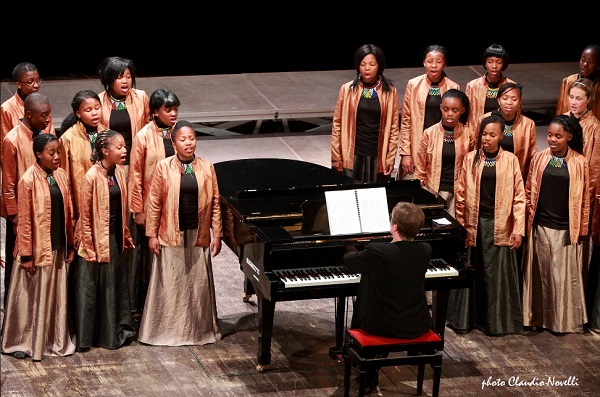by Rita Fucci-Amato, conductor and postdoctoral researcher, University of São Paulo (USP), Brazil
Choirs can be understood as organizations, because they have people, material resources and a management function that organizes and directs all activities to the provision of a cultural service or product. The cooperative aspect is intrinsically linked to the nature of choral singing and constitutes its essential point as an organization. This takes on a special dimension viewed from Chester Barnard’s perspective[1]. This pioneer author identified the main function of the executive as creating and communicating a common proposal. In this sense, a maestro is closer to a manager, as a conductor, is a leader capable of creating and maintaining a polyphonic collective harmony, the basis of the artistic and music educative work developed mainly in amateur choirs. The cooperative note characterizing this network that constitutes a ‘choral’ organization was described by the Brazilian maestro Heitor Villa-Lobos (1887-1959):
Collective singing, with its power of socialization, predisposes the individual to lose, whenever necessary, the egoistic notion of excessive individuality, integrating himself/herself in the community, valuing in his/her spirit the idea of the need to renounce and the discipline to face up to the imperatives of social collectivity, favoring, in summary, this notion of human solidarity […].[2]
By meeting the norms of the choir, by dedicating themselves to the learning of music during rehearsals and ‘extra hours’, the individuals support the group by seeking for common goals, thus creating a group charisma, and thus conflicting sentiments and obstacles are removed. This musical practice develops a sense of group union through common scope and values, in that individual predispositions and activities are channeled into an artistic collective production governed by rigorous discipline, serious study and the dedication of everyone. Choral singing is a common example of teamwork and represents a musical practice developed and widely known among the most different cultures and ethnic groups. Being a group pursuing musical learning, vocal development, interpersonal integration and social inclusion, the choir is a space constituted by different social and teaching-learning relationships; it demands from the conductor a number of competences and abilities not only concerning the technical musical preparation, but also in reference to the management and direction of a team that looks for motivation, education, culture and new aesthetic and social experiences. A choir has different levels of action and promotes individual integration in various dimensions, from personal motivation to interpersonal relationships, from aesthetic expression to political symbolism and communitarian role.
By their power and competence to guide these complex organizations, maestros are a very common example, in managerial literature and discourse, of efficient leadership, based on hearing and teaching, on learning and cooperation. In fact, maestros are selected by managers as the perfect example of management, but in a much romanticized vision: the maestro on the podium, the theatricality of his gestures, the baton …
On the one hand, in amateur musical groups, markedly in amateur choirs, the managerial work of conductors is much wider behind the stage, in the day-to-day tasks like networking, searching for partners and sponsors, marketing, organization of agendas and rehearsals rooms, etc – not to mention the serious motivation that choral conductors have to develop and cultivate in groups where participation is open to all and voluntary, but where nevertheless there must be musical results. It is necessary to produce such a level of pleasure that it compensates for the hard technical work of repeating and correcting the musical phrases, paying attention to details in rhythm, breathing and dynamics. On the other hand, in professional choirs – as in professional orchestras – maestros are increasingly being challenged in their abilities to create a good personal climate, managing the human relations in teamwork and engaging in socially and culturally sustainable practices involving the community. All that reality, which the conductors know only too well, reveals a deeper dimension in our managerial roles, not synthesized in the mere caricature of commanding a group by ‘simple’ gestures on a podium.
Choirs are paradigms of teamwork and motivation and examples of learning and knowledge organizations, while conductors are symbols of leadership and efficient management … “Despite the persuasive power of these images, the real face of the maestros’ job and of musical organizations in their day-to-day life cannot be revealed unless we open our eyes to their work behind the stage and before the concerts.
While managers base their perspectives on an idealized – usually authoritarian – view of the work of conducting, maestros need to perform a lot of managerial tasks in order to turn the artistic goal into reality, but among traditional conductors this pragmatic but indispensable aspect of their work is typically despised. As almost all maestros need to be managers for conducting the collective musical work, the consequence is that we learn only by doing, by trial and error. Viewed from this angle, this scenario suggests that a deeper and clearer analysis of this universe – management tasks inserted in musical conducting – is very welcome. This is the premise of my research.
I am developing a postdoctoral research project on the theme ‘The work of the maestro as a manager and the organizational perspective of choral singing: interdisciplinary contributions for managers and conductors’. This project is based at the University of São Paulo (USP), Brazil, and is funded by the São Paulo State Research Foundation (FAPESP: www.fapesp.br/en). In a first phase of the research, I studied cases of Brazilian choirs and choral conductors, accompanying the work of some groups and musicians, and interviewing them. In a second phase, I am asking for choral singers and maestros from all over the world to complete a questionnaire about how their choirs are managed and about the organizational difficulties that they face. Many singers and maestros from many countries – like Italy, Switzerland, the Netherlands, Mexico, Argentina, England, the USA, Canada, etc. – have already contributed their answers. But the panel is not complete, and this call for contributions, through the International Choral Bulletin, has the intention of extending this rich panel of choral activity to different realities and countries. The questionnaire, both for conductors and singers, is available in three languages and can be accessed by the following links:
- http://goo.gl/N10jI (in English);
- http://goo.gl/62jcu (in Spanish);
- http://goo.gl/GX9Bp (in Portuguese).
The questionnaires will be available until June, 2012. Conductors and choirs taking part in this research will be cited in a special acknowledgement list which will be published on the website http://choralmanagement.blogspot.com/. This website will be enriched through time by the publications (like papers in journals and conference proceedings) analyzing the results of the research. The individual answers concerning singers, choirs and maestros will be displayed anonymously. All these data will be focused on theoretical bases using headings such as: the manager’s job, human resource management, leadership, motivation, organizational culture, organizational learning, etc. Therefore, through the answers of singers and conductors it will be possible to propose new models and approaches to the difficult – and necessary – activity of managing choral organizations. Thank you in advance for your contribution!
[1] Barnard, C. (1966), The Functions of the Executive. Harvard University Press, Boston.
[2] Villa-Lobos, H.: Villa-Lobos por ele mesmo, in Ribeiro, J. C. (ed.), O pensamento vivo de Villa-Lobos. Martin Claret, São Paulo (1987), p. 87.
Edited by Irene Auerbach, UK




